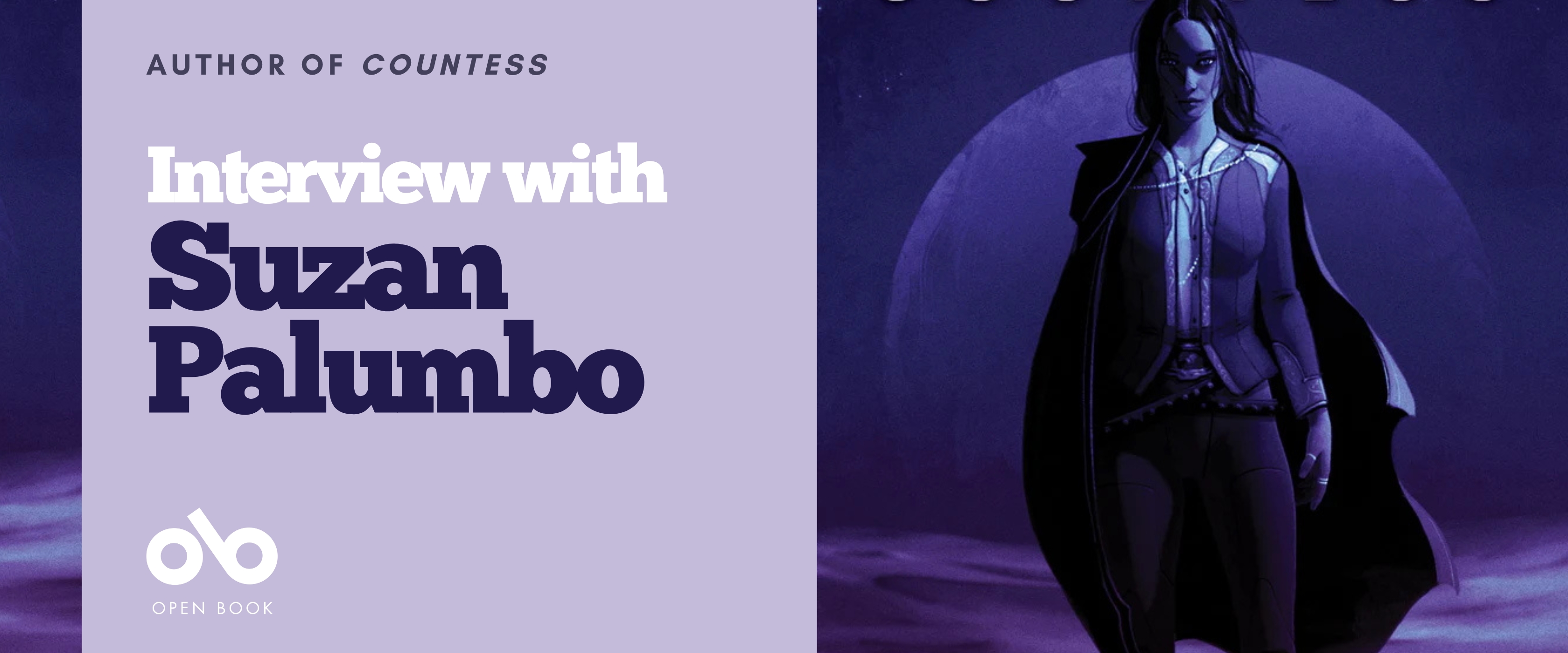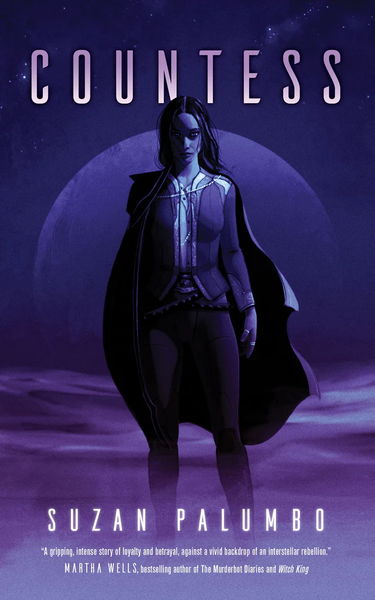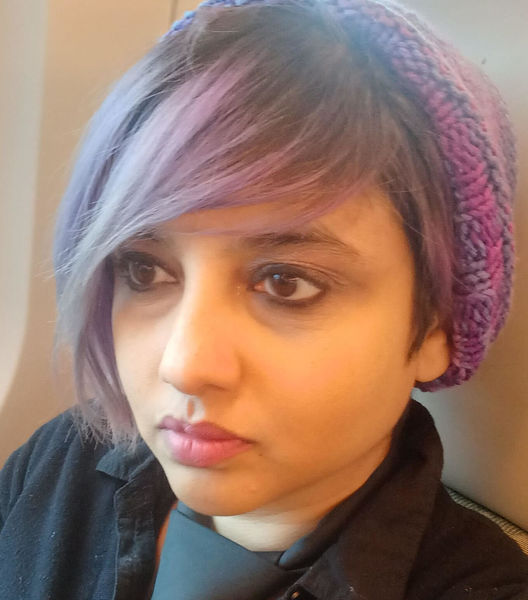Suzan Palumbo's Novella Countess is a Queer, Caribbean, Anti-Colonial Sci-fi Epic
Suzan Palumbo has already turned heads in her previous work, with short fiction that has been nominated for the Nebula, Aurora, and World Fantasy Awards. Avid sci-fi readers will delight in immersing themselves in the world of her new novella.
In Countess (ECW Press), we are thrust into interplanetary adventure with the formidable Virika Sameroo, living in colonized space under the boot of the Æcerbot Empire. She has advance in the empire's merchant marine to the rank of lieutenant, only to watch her life thrown into chaos as her captain dies mysteriously. Wrongfully charged with treason and murder, Virika is arrested and imprisoned, which spurs her on to seek revenge and galactic justice against this evil empire.
Find out more about the author and her unique influences and must-reads in this Writers as Readers interview!
Open Book:
The book I have re-read many times:
Suzan Palumbo:
Jane Eyre! I was a very awkward, shy tween/young teenager who spent a lot of time reading and watching nerdy nature documentaries. At around aged fourteen, I decided I was going to read SERIOUS grown up books and so I walked to the library and went directly to the classic literature section. Jane Eyre by Charlotte Brontë was the first book I picked out of the stacks. I had no idea what the story was about, only that it looked and sounded sad judging by that particular Penguin edition’s cover and the back copy. I went home and became absorbed in Jane’s story. I related to her isolation and struggle deeply and was shattered when Mr. Rochester dragged her back to Thornfield Hall to reveal his wife, Bertha Mason, living in the attic! It immediately became my favourite book. I went on to reread it a couple summers later. I then read it several more times for my literature classes at university and once in my mid-twenties. I haven’t revisited it in many years. I’m curious about how my perspective has changed with respect to Jane. I remember being touched by how earnest her voice felt. Would it have the same effect on me today? I don’t usually reread books anymore but I might with Jane Eyre just to see how I feel about it now as a full-fledged adult.
OB:
A book I feel like I should have read, but haven't:
SP:
I’m going to be cheeky and say I never feel I “should” have read anything anymore. When I was younger I was interested in reading the English literature canon. Because of that goal and my degree, I have a pretty thorough general English literature background. I’ve read everything from Beowulf and Chaucer, in middle English, to Poison Ivy comics. These days I look for books that grab me, spark a new idea or that move me. I find those kinds of books in every genre and format. One of the wonderful things about art is that we all come to it from different subjective backgrounds. There’s no need to feel regret or the fear of missing out on a particular novel, in my opinion, because I’m always moving towards what’s meaningful to me in the moment. Reading for that experience is Queen for me.
So to answer my interpretation of this question, the book I feel like I “should” read is the one in front of me. I’m currently in the middle of Ava Ried’s Lady Macbeth. I picked it up while on vacation in Scotland this August. I’ve always been a fan of the play and this, so far, is a lyrical take on Lady Macbeth’s backstory. I’m especially enjoying the voice and prose.
OB:
A book I feel strongly influenced me as a writer and why:
Your CanLit News
Subscribe to Open Book’s newsletter to get local book events, literary content, writing tips, and more in your inbox
SP:
The Traitor Baru Cormorant by Seth Dickenson wrecked me. It is one of the few books that I have thrown across the room when I finished reading it. This, if it isn’t clear, is a positive reaction for me! If you are unfamiliar with the novel, it tells the story of a brilliant, young woman, Baru, whose homeland is colonized and way of life is destroyed. She is brought up and educated by the empire that subjugated her people to serve the empire’s interests. Baru must make a decision. Does she assimilate and do what the empire demands for her own survival or, does she rebel against the oppressors who destroyed her family and community? Baru makes a devastating choice at the end of the book; a choice that took my breath away. Her decision and the reasoning behind it have gnawed at me for several years.
Countess, my novella out on September 10th from ECW Press, wrestles with a similar choice. What should Virika, our protagonist, do when faced with injustice and oppression? What becomes meaningful to a person who is put in such a dire situation? And what are the consequences of those decisions? I have to thank Seth Dickenson in part for his incredibly affecting book. It, along with Dumas’ Count of Monte Cristo, inspired me to write my own.
OB:
The book I plan on reading next:
SP:
Monstrilio by Gerardo Sámano Córdova is next on my list. It’s the story of a mother, who in her grief, cuts off a piece of her deceased son’s lung. She then nurtures this tissue as it grows into someone like Santiago, the child she lost. The narrative follows Santiago, from what I’m told, as he grows and leaves Mexico City. There is so much about this premise that speaks to me. The overt parallels to Mary Shelley’s Frankenstein leap out immediately as well as all of the gothic considerations entailed within a story about monstrosity, love and humanity. I can’t wait to read it. I’m in want of a book that is ardently emotional and I hope Monstrilio destroys me.
OB:
My go-to recommendation when someone asks for something great to read:
SP:
Not everyone is a short story reader but if someone is, I tell them how much I love the collection “The Bloody Chamber” by Angela Carter. Her writing is precise, visceral and filled with such deep aching. It is a mind bending book. I am of the belief that the myriad of fairy tale and folkloric retellings we have today can trace their lineages, in part, back to Angela Carter and her deconstructive approach to the latent sexuality in the stories we tell. I see her influence everywhere. My favourite story from the book, if I had to choose one, would be “The Lady of The House of Love.” The lines, “now you are at the place of annihilation, now you are at the place of annihilation,” in the text gave me chills when I first read them. They still do!
OB:
A possible title for my autobiography:
SP:
“She came. She saw. She chaosed.”
Often when one is a writer your days are filled with deadlines, word counts and edits. In fact, much writing advice encourages steady dependable routines and regular work hours. This is sound advice and I have to follow it in order to get my projects done. That said, feel I produce my best work when there is room for a bit of spontaneous chaos in my days. I am deeply curious and passionate about so many things. I’m always excited to try a new food, listen to a new type of music or experience a new place. I am also painfully aware that my most precious possession is my time and that my time is in shorter supply every day. I want to live a life filled with art and the word YES. I have learned more about myself and the world from my encounters with the unexpected rather than the planned. As a result, I fully embrace benevolent chaos. I invite it into my days and I think that makes for more introspective, weirder and sometimes funnier stories. It’s also makes for a happier me.
___________________________________________
Suzan Palumbo is a Trinidadian-Canadian dark speculative fiction writer and editor. Her short stories have been nominated for the Nebula, Aurora, and World Fantasy Awards. Her debut dark fantasy/horror short story collection, Skin Thief: Stories, is out now from Neon Hemlock. She lives in Brampton, ON.







